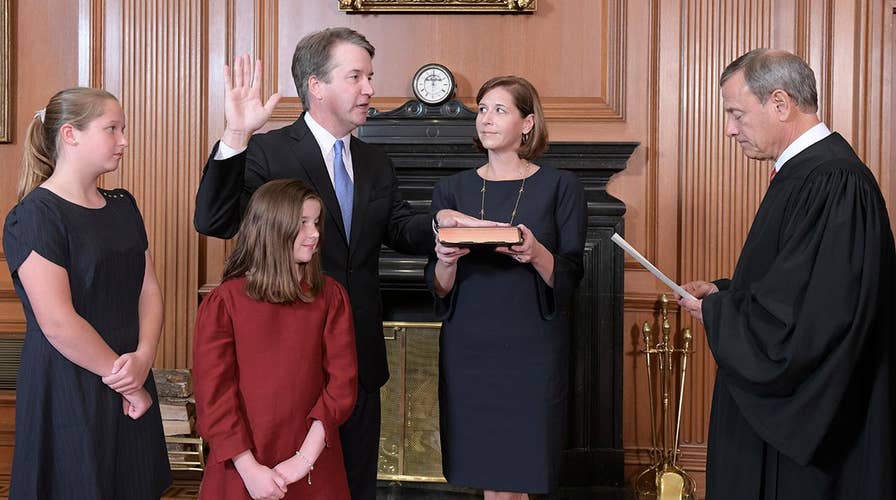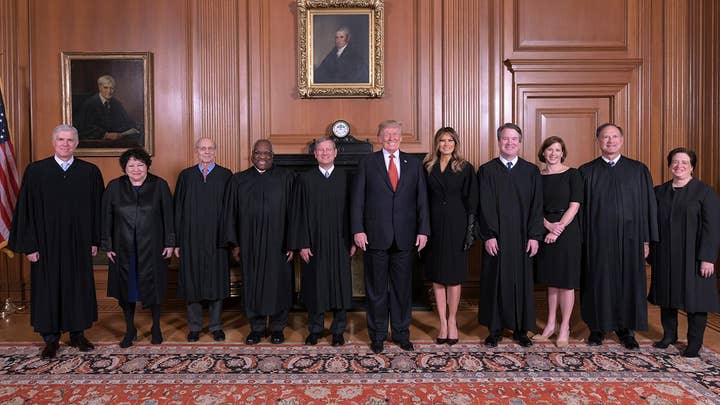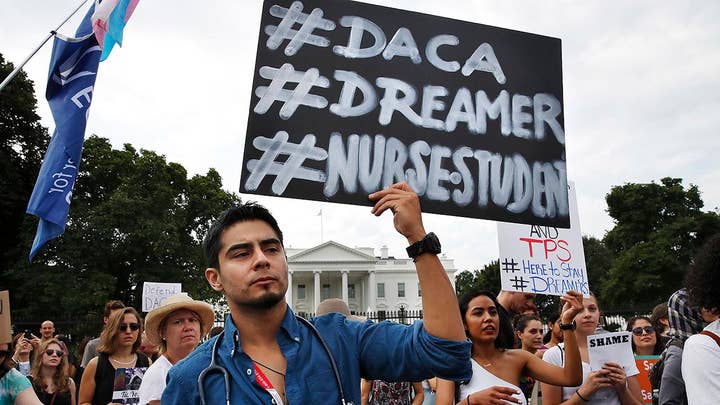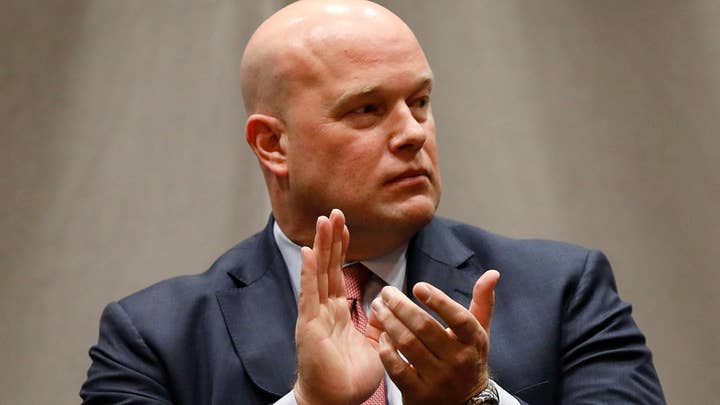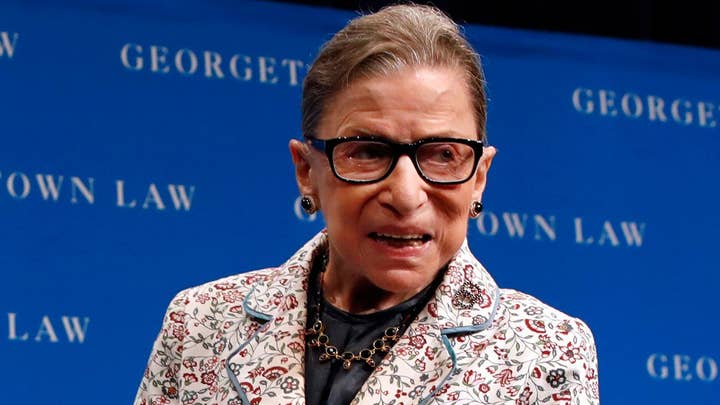Brett Kavanaugh joins a divided Supreme Court
Fox News chief legal correspondent and anchor of 'Fox News @ Night' Shannon Bream examines how much Brett Kavanaugh might actually change the court.
Justice Brett Kavanaugh had never heard a death penalty case in his 12 years as an appeals judge. But when confronted with the issue in just his third week at his new job, Kavanaugh wasted little time expressing a measure of concern for the capital inmate facing lethal injection.
"Are you saying, even if the method creates gruesome and brutal pain, you can still do it because there’s no alternative?" he asked in an oral argument earlier this month on Missouri's protocols.
In a sharp tone, Kavanaugh pressed for a clear, direct answer from the state's attorney general -- who replied yes, so long as the state did not "attempt to deliberately inflict pain for the sake of pain."
"Is there any limit on that?" asked the justice, sounding skeptical.
The court has yet to issue an opinion on any case that Kavanaugh has participated. The 114th member of the high court may yet turn out to be the reliable conservative President Trump has hoped when nominating Kavanaugh, following the retirement of his mentor, Justice Anthony Kennedy.
Until then, he remains something of an ideological question mark, particularly on issues where his previous record is scant.
"I think there are many issues where he has the potential to be the swing vote," said Thomas Dupree, a former top Bush Justice Department official. "I think if you look at the death penalty, abortion, immigration, administrative law questions, these are all disputes that have split the court along partisan lines. Now there is a new justice, I think everyone is going to be angling for his vote."
Outcomes of five big issues now or soon to be tackled by the Supreme Court will test Kavanaugh's conservative credentials -- and he could prove the deciding vote, much like the man he replaced.
Ultimate Punishment
After the one-hour public session dealing with capital punishment, Kavanaugh's vote is likely to be the crucial tie breaker on a closely divided 5-4 conservative majority. The high court in March -- without Kavanaugh -- stayed Russell "Rusty" Bucklew's execution at the last moment, with Kennedy at the time typically providing the "swing" or deciding outcome.
The inmate claims lethal injection would rupture tumors in his neck and cause him to "choke" on his own blood.
At issue is whether a condemned prisoner has the burden to show another execution method that would reduce the risk of needless suffering.
Prosecutors say Bucklew was jealous over the end of a relationship and went on a violent spree in 1996 that included murdering a man, shooting at a child, kidnapping and raping a woman, attacking the woman's mother with a hammer, and wounding a police officer.
Kennedy-- for whom Kavanaugh had clerked in 1993-- had in recent years expressed strong views on outlying questions of the death penalty's application-- including prosecutorial misconduct, intellectual disability, and juror or judicial bias. He was the deciding vote in five recent such cases.
The current court is wrestling internally whether now is the time to take a landmark look at the overall constitutionality of the death penalty-- whether a death sentence is in itself "cruel and unusual" punishment. Recent capital cases have sparked conflicts between the justices over efforts to apply an amorphous application of the legal phrase "evolving standards of decency" under the 8th Amendment-- meaning changing times deserve a fresh look at old issues.
Yet Kavanaugh in a speech last year cast a skeptical eye on any major revision, saying "to this day, the death penalty remains constitutional. Many judges and justices no doubt have policy or moral concerns about the death penalty." But he noted it needed to remain in "its proper and limited role in the constitutional scheme."
And Kavanaugh quoted the late Chief Justice William Rehnquist's 1972 warning against striking down laws "based upon notions of policy or morality suddenly found unacceptable by a majority of this court."
Immigration Consternation
The president is on a legal losing streak. Almost every lower state and federal court has struck various aspects of Trump's immigration policies:
-- The original "travel ban" on entry by those from several, mostly Muslim countries
-- Immigration enforcement in so-called "sanctuary" cities
-- Plans to move ahead on the border wall amid environmental concerns
-- Administration efforts to gut TPS-- the Temporary Protected Status program allowing about 300,000 refugees to legally work in the U-S while their home countries remain in turmoil from natural disasters, war, and political unrest
-- A "zero-tolerance" enforcement strategy, leading to more than 2,500 family separations earlier this year
-- And just this week, a federal judge temporarily blocking the administration from refusing asylum to immigrants crossing the border illegally. That was a response to migrant caravans massing around the 26 official border crossings with Mexico.
The Supreme Court alone has provided limited legal victories for the administration, including allowing the travel ban policy to proceed, in a 5-4 decision in June. The other issues are percolating up the justices and could be addressed in coming weeks or months.
Again, Kavanaugh's appeals court record is scant on immigration, but critics say in the handful of cases he considered, the immigrant lost.
Kavanaugh has so far heard only one such dispute at the Supreme Court: which undocumented immigrants can be detained during deportation proceedings, including those with criminal records.
In just his second day on the bench, the newest member took a hardline approach, suggesting a 22-year-old federal law would permit long detentions, if necessary.
"What was really going through Congress’s mind in 1996 was harshness on this topic," he said in the one-hour public session.
Perhaps Kavanaugh's most talked-about ruling while on the DC Circuit, dealt with an undocumented teenager's efforts to seek an abortion last year while in U.S. custody in Texas.
His appeals court colleagues granted the request, and the high court later dismissed the Trump administration’s petition as moot, after the girl went through the medical procedure.
But Kavanaugh had dissented, saying immigrants like the teen were being given a "new right" to obtain an abortion on demand.
DACA Dissension
And there are efforts by the president to eliminate DACA -- the Deferred Action for Childhood Arrivals program championed by President Obama.
It has given about 700,000 undocumented immigrants -- many called "Dreamers" -- brought illegally to the U-S and allowed to live here and get education and work permits.
The Justice Department has appealed recent rulings by three federal courts to keep DACA in place-- at least temporarily while the issue moves up the judicial food chain. Those judges faulted the government for how it chose to end the program, saying it relied on faulty legal judgment.
Just days after Kavanaugh took his oath of office, the administration sought to have the high court fast-track the issue, but the court followed tradition and is allowing the cases to be fully heard first at the lower level.
Trump officials "don't look like they want to give Brett Kavanaugh a long ramp-up period. They are going to be teeing up issues on the Supreme Court's plate as quickly as possible," said Dupree. "I think the administration is confident they have his vote in many of these cases."
The White House has been increasingly frustrated by judges hearing lawsuits in one regional court issuing nationwide injunctions on enforcement. That holding pattern has been the outcome urged by states and private advocacy groups challenging the various immigration reform efforts.
In particular, the San Francisco-based 9th Circuit region has the president's anger, on Tuesday calling various rulings and orders a "disgrace."
"In the first 175 years of this Republic, not a single judge issued one of these orders," said then-Attorney General Jeff Sessions in one of his last speeches before resigning under pressure earlier this month. "But they have been growing in frequency and, since President Trump took office less than two years ago, 27 district courts have issued such an order," he said.
Who's in Charge Here?
Speaking of the Attorney General, the Supreme Court is already being asked to weigh in on the man chosen to take over temporarily for the departed Sessions.
Acting Attorney General Matthew Whitaker -- who was Sessions' chief of staff -- has never been confirmed by the Senate for a principal Justice Department post, and that, say critics, makes his appointment unconstitutional.
It may seem like typical Washington politics, but the issue of who is in charge goes to the heart of executive power, an issue the Supreme Court is often asked to resolve.
One of the first lawsuits filed over Whitaker's authority comes from a former associate of onetime Trump adviser Roger Stone, reportedly under investigation by the special counsel investigating possible Russia collusion in the 2016 election.
A federal appeals court this month ordered Robert Mueller to explain how the leadership shakeup at the Justice Department would affect an ongoing lawsuit over the special counsel's authority.
Whitaker now has oversight over the Mueller probe, and the judges want to know "what, if any, effect the November 7, 2018 designation of an acting Attorney General different from the official who appointed Special Counsel Mueller has on this case."
Whitaker has given no indication he would recuse from his oversight, as Sessions had done. It is the first time a federal appeals court is weighing in on Mueller's actions as special counsel.
Another legal challenge comes from three Senate Democrats on the Judiciary Committee. And still another from the state of Maryland over Trump efforts to rollback parts of the Obama-era Affordable Care Act.
And a separate Maryland dispute over gun rights has already reached the high court, with the justices asked to rule quickly on Whitaker's authority before the lawsuit can proceed. A high court order could be issued early next month.
Kavanaugh has heard many disputes over presidential power in his appeals court career, and has generally advocated for a robust executive authority. Those issues ranged from environmental policy, Obamacare, and workplace regulations. But on presidential appointments, some concern on the right that Kavanaugh and his fellow conservatives may do to Trump what they did to then-President Obama.
Justice Clarence Thomas -- Trump's "favorite" justice -- last year concluded the previous president overstepped his authority by naming a general counsel to lead the National Labor Relations Board on a temporary basis, later making it permanent. But the Senate never confirmed the official.
The high court then invalidated a host of NLRB decisions made by the official, with Thomas warning, "Appointing principal officers under the [Federal Vacancies Reform Act], however, raises grave constitutional concerns because the Appointments Clause forbids the president to appoint principal officers without the advice and consent of the Senate."
Stand Up and Be Counted
Immigration is also at the forefront of an executive spat over the 2020 census, and plans by the administration to include a question on citizenship.
The Supreme Court has agreed to hear arguments in February over whether Commerce Secretary Wilbur Ross acted legally when adding the question in the once-a-decade head count.
At issue for the justices will be what kind of evidence can be considered in an ongoing lawsuit, including the deposition of a top Justice Department official. Kavanaugh and his colleagues had earlier denied a request by a dozen states and cities, plus civil rights groups, to depose Ross himself, for the district court trial that ended last week. The justices had separately allowed that trial to proceed.
Ross argues the citizenship question will allow proper enforcement of the Voting Rights Act. Opponents say it will discourage immigrant households from participating in the survey, and thereby skew the population figures.
"The Trump administration is terrified of having to explain on the record why it added a census citizenship question," said Dale Ho, director of the ACLU’s Voting Rights Project. "The record is clear that the administration added the citizenship question to intimidate immigrant communities, not to enforce the Voting Rights Act.”
Cross to Bear
At a busy intersection in the Maryland suburbs just outside Washington stands the Peace Cross, a memorial to World War I veterans. The 100th anniversary of that conflict was commemorated earlier this month.
Lower courts ruled the 40-foot tall cross in a highway median "has the primary effect of endorsing religion and excessively entangles the government in religion."
The state's governor and other officials say the monument's context and history show it is intended to convey a secular message or remembrance, not a religious message.
Now the Supreme Court will have the final say, with oral arguments early next year. It will be the first hot-button social issue to be addressed by the justices this term, and by its newest member.
It is an issue of deep importance to many conservatives. The Trump Justice and HHS Departments earlier this year launched separate offices of religious freedom and liberty.
In Kavanaugh's contentious Senate confirmation, Ted Cruz, R-Texas, attacked Democrats who he claimed "want justices that will further that assault on religious liberty."
The nominee was more subdued, refusing multiple invitations to engage in that debate or say how he would vote in such cases. Instead he offered bland support for "the principle of religious liberties written right into the First Amendment to the Constitution, and the Framers understood the importance of protecting conscience."
The conservative-led high court in recent years has rebuked government officials who would infringe on private individuals or groups expressing their religious conscience in objecting to laws that protect LGBTQ and reproductive rights.
Those include a narrow June decision backing a Colorado baker's refusal to make a custom wedding cake for a same-sex couple; and a 2014 ruling giving some closely-held for-profit corporations the right to withhold coverage of contraception for their employees.
Kavanaugh, who is Catholic, dissented in 2015 in similar case at his appeals court, over whether the Obamacare mandate to provide contraception applied as well to religious non-profits with a doctrinal opposition, such as charities, hospitals and schools.
Now the current Maryland cross case gives the high court another opportunity to expand on the contentious intersection of faith and the law, with a fresh voice who could be the controlling vote.
Building Influence
At the Supreme Court, every vote by the justices counts the same, although who writes the all-important opinions-- where precedent is established-- often falls to more senior members. The "new guy" may have to wait years to have his judicial imprint on society and the law. For years, Justice Kennedy held that role, authoring landmark rulings on gay marriage, abortion, and school prayer.
Kavanaugh seems poised to play for the long-term, for now keeping a low-key personal and professional profile.
"He is not going to try and establish a reputation right out of the gate as bomb thrower," said Dupree. "When people look back on Kavanaugh's first year on the bench, they're going to say this is the right justice at the right time."








































